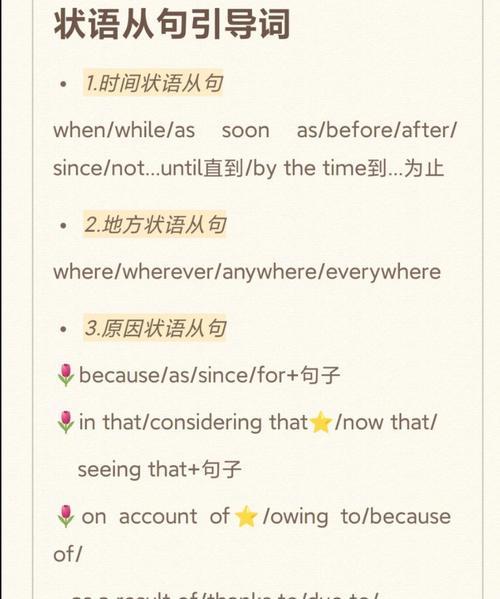英语中的从句可以由多种词语引导,包括名词性从句和副词性从句。名词性从句可以由"that", "whether/if", "who/whom/whose", "where/when/why/how"等词引导,充当主语、宾语、表语或同位语。副词性从句可以由"if/whether", "when/while/as", "wherever/whenever/whatever/whoever"等词引导,充当状语。掌握这些词语可以帮助我们更好地理解和运用英语语法,构建更复杂和准确的句子。

首先,我们需要了解两种从句:名词性从句和副词性从句。名词性从句可以充当主语、宾语、表语或同位语,而副词性从句则可以充当状语。
以下是一些常见的引导从句的词语:
名词性从句
-
that:用于引导主语、宾语和表语从句,例如:
- That he is late is unacceptable.(他迟到是不可接受的。)
- I believe that she is telling the truth.(我相信她在说实话。)
- My hope is that we can finish this project on time.(我希望我们能按时完成这个项目。)
-
whether/if:用于引导主语、宾语和表语从句,表示“是否”,例如:
- I'm not sure whether/if he will come to the party.(我不确定他是否会来参加聚会。)
- She asked me whether/if I like coffee or tea.(她问我喜欢咖啡还是茶。)
- The question is whether/if we should invest in this project.(问题是我们是否应该投资这个项目。)
-
who/whom/whose:用于引导主语和宾语从句,分别表示“谁/谁/谁的”,例如:
- Who broke the vase?(谁打破了花瓶?)
- Do you know whom he is talking to?(你知道他在跟谁说话吗?)
- She asked me whose book this is.(她问我这是谁的书。)
-
where/when/why/how:用于引导表语从句,分别表示“哪里/什么时候/为什么/如何”,例如:
- His biggest concern is where to go for vacation.(他最担心去哪里度假。)
- The question is when to start the project.(问题是什么时候开始这个项目。)
- I don't understand why he is always so angry.(我不明白他为什么总是那么生气。)
副词性从句
-
if/whether:用于引导条件状语从句,表示“如果/是否”,例如:
- I will go to the party if/whether I finish my work.(如果我完成了工作,我就会去参加聚会。)
- We need to figure out if/whether the product is safe for use.(我们需要弄清楚这个产品是否安全可用。)
-
when/while/as:用于引导时间状语从句,表示“当/同时/随着”,例如:
- I always feel sleepy when I read in bed.(我总是在床上读书时感到困倦。)
- While I was cooking, the phone rang.(我在做饭的时候,电话响了。)
- The company is expanding rapidly as more customers are using our services.(随着更多的客户使用我们的服务,公司正在迅速扩张。)
-
wherever/whenever/whatever/whoever:用于引导地点、时间、方式或人物状语从句,分别表示“无论在哪里/无论何时/无论什么/无论谁”,例如:
- You can find a good restaurant wherever you travel.(无论你去哪里旅行,都可以找到好的餐厅。)
- She always wears a dress whenever she goes to a party.(她每次去聚会都穿连衣裙。)
- We need to do whatever it takes to finish this project on time.(我们需要尽一切努力按时完成这个项目。)
- I don't care whoever comes with me to the concert.(我不在乎和谁一起去听音乐会。)
